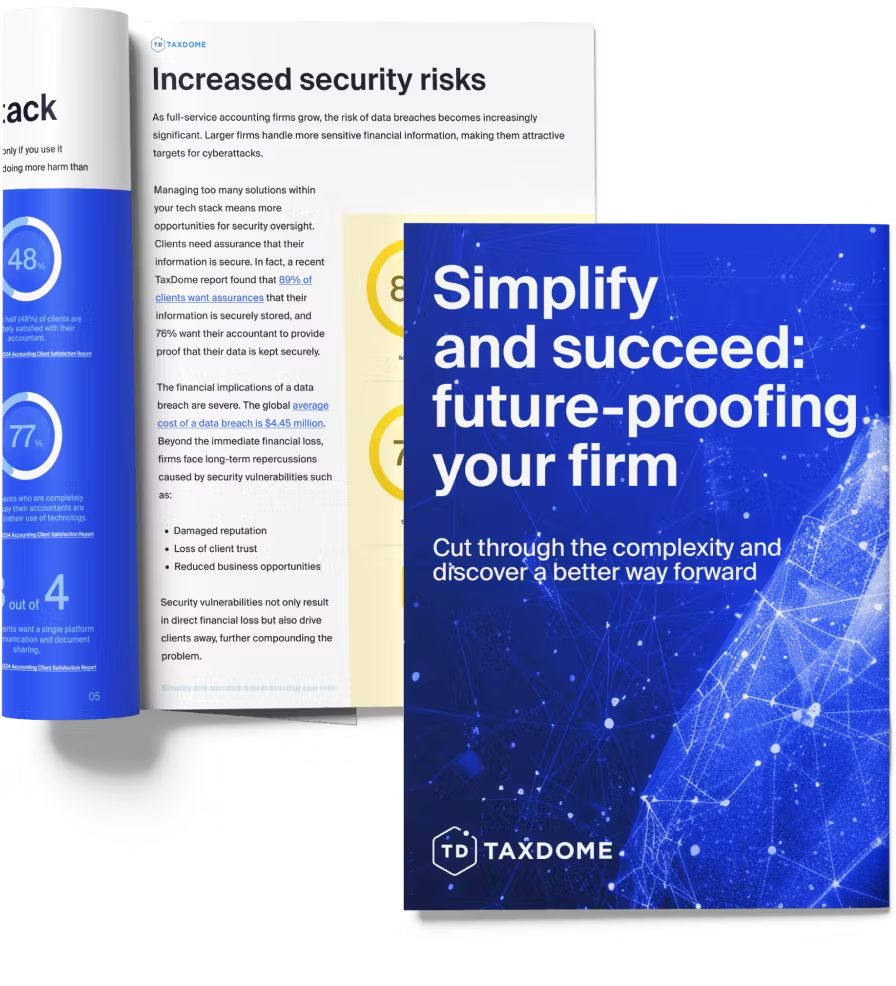
Accounting may not be the most glamorous industry, but it’s certainly one of the most important. Accountants play a central role in ensuring financial stability, compliance, and success. But what makes a great accountant great?
In addition to experience and expertise, there are several telltale traits that the best accountants tend to share. In this article, we’ll explore some of the most important qualities of an accountant. We’ll also look at how they can be applied in practice.
Of course, having the right traits is only part of the equation. To unlock their true potential, accountants need the best technology. This is where TaxDome comes in. As the most comprehensive practice management software on the market, TaxDome has the tools you need to take your accounting work to the next level.
12 essential personality traits of accountants
So what do you need to stand out in the accounting world? Here are 13 characteristics of a good accountant — along with some real-world examples of how they can be applied.
1. Meticulous attention to detail
In accounting, small details matter. A missed decimal point here or an added zero there can have significant consequences. Technology has liberated accountants from much of the repetitive work. However, precision and thoroughness are still essential qualities.
Attention to detail is a trait accountants apply on a daily basis, across all sorts of tasks. For example:
- Identifying discrepancies when reconciling accounts
- Ensuring that tax filings meet stringent compliance requirements
- Reviewing the accuracy of financial statements to meet legal and industry standards
2. Ethical decision-making
Trust and integrity are central to the success of any accountant professional. Accountants are entrusted with handling sensitive financial information. The decisions they make change the course of businesses and lives. No wonder the CPA exam has a section for professional ethics.
By upholding ethical standards, accountants can protect themselves and their clients from harm. They can also build a strong reputation as a trustworthy and credible professional. So what does ethical decision-making look like in practice? Here are some examples:
- Resisting pressure from clients or senior staff to circumvent regulatory requirements
- Avoiding situations where personal interests could compromise professional judgment or client trust
- Reporting any suspicious activities or fraud in line with legal and ethical obligations
3. Tech fluency
Technology is reshaping the accounting industry. From AI software and accounting automation tools to real-time data analytics, accountants today can access powerful tech that drive efficiency and accuracy.
But success with technology isn’t a given. To keep up with the pace of change, accountants must embrace the latest innovations. They must be willing to rethink the way they work, the role they play, and what clients expect — again and again. Accountants who are committed to maintaining tech fluency will outperform those who don’t.
Here are some examples of tech-fluency in action:
- Exploring how AI-powered tools can be used to streamline a broad range of tasks
- Using practice management software to automate workflows and provide a slick client experience
- Leverage real-time reporting and analytics to gain insights into your team, clients, and business
4. Strategic thinking
The stereotype of an accountant as a number-cruncher is outdated, to say the least. Today, top accountants play a pivotal role in shaping business strategies through financial insights. Having a strategic mindset will set you apart from the crowd. It will help you anticipate future accounting trends and provide valuable advisory services that drive financial growth.
Here are just a few of the ways accountants can leverage strategic thinking to provide real value to businesses and individuals:
- Developing comprehensive budgets that align with an organization’s strategic goals
- Identifying financial risks and proposing mitigation strategies to protect the company’s assets
- Crafting plans to minimize tax liabilities while remaining compliant with regulations
5. Empathy and emotional intelligence
Empathy and emotional intelligence might not be the first qualities that come to mind when you think about accounting. But in an increasingly client-focused environment, these are essential accountant personality traits.
Accountants must understand the individual needs of their clients on a deep level. They must build trust and respect over time. And in many cases, they must work as part of a wider team to achieve the best possible outcomes. All of these situations require empathy and emotional intelligence.
Let’s look at some real-world examples of this trait in action:
- Actively listening to client concerns and explaining solutions in a way they understand
- Solving disputes by understanding differing perspectives and finding common ground
- Building positive relationships with colleagues by demonstrating respect, patience, and understanding
6. Problem-solving creativity
Accounting is full of problems that need fixing. The best accountants approach such challenges with a creative mindset. This enables them to uncover innovative solutions and identify new opportunities for growth.
In other words, great accountants think outside the box. They go beyond conventional approaches to maximize value for their clients and businesses. Here are some examples of how they might achieve this:
- Identifying industry-specific tax credits or deductions that reduce a client’s tax liability
- Designing custom workflows that automate repetitive tasks, saving time and reducing costs for the firm
- Analyzing spending patterns to uncover areas where costs can be cut
7. Time-management expertise
Accountants operate in a fast-paced environment. On any given day, they have to juggle multiple clients, tight deadlines, and intricate tasks. The best accountants can manage time and prioritize work effectively — even during busy periods.
Technology plays a huge role in effective time management. Accountants who embrace time-saving tools have a clear advantage.
Let’s look at some examples of time management in practice:
- Handling increased workloads during tax season by automating workflows and delegating tasks efficiently
- Using tools like TaxDome to automatically onboard clients and gather information and documents
- Effectively prioritizing urgent client issues, such as addressing time-sensitive tax compliance matters
8. Client-focused mindset
In recent years, technology has changed the way service businesses interact with clients. Clients now expect personalized services and slick, digital interactions. Accountants with a client-focused mindset can build long-term relationships and grow their businesses.
Here are some ways that top accountants provide an exceptional client experience:
- Leverage platforms like TaxDome that offer a client portal and client mobile app
- Automating client communication, so each client is kept in the loop at all times
- Offering personalized services that are tailored to the needs of individual clients
- Providing engaging content and live events that provide real value to clients
9. Curiosity for industry trends
The accounting industry is constantly evolving. The best accountants stay ahead of the curve through continuous learning. They keep their fingers on the pulse of new technology trends and best practices. This requires a curious mind and an adaptable, open-minded approach.
Curiosity for industry trends yields great results. By adopting the latest technologies, accountants can provide an industry-leading service. They can also maximize the opportunities that fast-growing accounting niches offer, such as cryptocurrency tax or green accounting.
Accountants can stay current with the latest trends in the following ways:
- Experimenting with the latest AI applications to enhance efficiency and improve client services
- Enrolling in courses or certification programs to deepen expertise in specialized areas
- Attending industry events and networking with forward-thinking professionals
10. Resilience and stress management
The accounting profession is infamous for its tight deadlines and high-pressure work. When you factor in demanding clients and the dreaded busy season, you can see why resilience is so important.
Beyond resilience, accountants need to find ways to manage stress and avoid burnout. Some use time-saving technology. Others experiment with mindfulness techniques. Whatever it takes to remain calm and focused!
Here are some situations that require resilience and effective stress management:
- Managing multiple client accounts during peak periods while ensuring quality and accuracy
- Quickly adjusting strategies when regulations or client requirements shift at the last minute
- Juggling urgent client requests alongside routine responsibilities without letting stress affect performance
11. Data interpretation skills
The rise of data analytics has changed the game for accountants in recent years. With excellent data interpretation skills, accountants can identify risks and uncover opportunities. They can turn raw numbers into actionable insights. Let’s look at some examples:
- Identifying patterns in revenue and expense data to forecast future financial performance
- Providing actionable insights from financial data to guide strategic decisions
- Evaluating financial data to detect potential vulnerabilities, such as cash flow shortages
12. Leadership potential
A career in accounting opens the door to all sorts of career opportunities. Accountants with great leadership attributes often go on to lead finance departments. Some even rise to the dizzy heights of CFO. Others may want to start their own accounting practice and lead a growing team.
Strong leadership abilities can set you apart from your accounting peers. They inspire confidence, drive performance, and improve team morale. Let’s look at some examples of accountants can demonstrate leadership in their day-to-day work:
- Encouraging teams to adopt new tools and processes that improve efficiency
- Training and mentoring team members to enhance their skills and improve performance
- Mediating disputes within teams or with clients to maintain a positive working environment
How to develop these traits
Some of the traits on this list will come naturally to you. Others may need work to build or refine. This is an ongoing process that requires dedication and commitment. Here are some ways you can fine-tune and develop the professional qualities on this list:
- Continuous self-education. Attend events, network with industry experts, and keep up with the latest trends and tools that are shaping the industry.
- Professional training. Consider expanding your expertise through additional training. You could study to become a CPA or learn how to master the latest accounting software.
- Hands-on experience. Develop your leadership skills and resilience through practical experience. Seek mentorship, take on additional responsibilities, and reflect on feedback.
The bottom line
To become a successful accountant, you need the requisite knowledge and expertise. But that’s not all. Besides accounting know-how, there are several key traits — or soft skills — that will help you excel. While some are lucky enough to be born with the traits on this list, anyone can develop and improve them. All it takes is dedication and time.
Most of the traits on this list can be nurtured or enhanced using the right technology. For example, TaxDome offers intuitive tools for client management, workflow automation, and secure document sharing. It empowers beginner and experienced accountants alike.
TaxDome is like the operating system for your practice. It boosts efficiency and team collaboration while helping you provide truly client-focused services. In other words, it makes great accountants and firms even greater.
Are you an accountant, CPA, or bookkeeper looking to take your career to the next level? Request a TaxDome demo today.

Thank you! The eBook has been sent to your email. Enjoy your copy.
There was an error processing your request. Please try again later.
What makes the best accounting firms thrive while others struggle to keep up? We analyzed our top 20 TaxDome firms, representing over $100M in combined revenue, to uncover the strategies driving their success.



